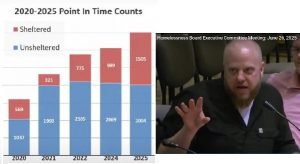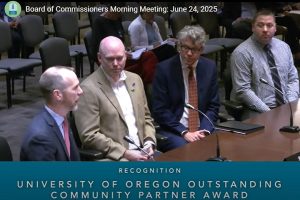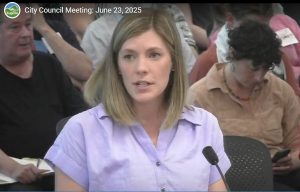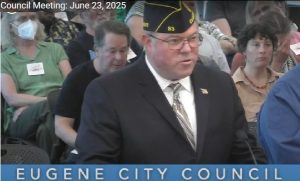Betty Taylor: Bring back the public service officer and the involvement committee
9 min read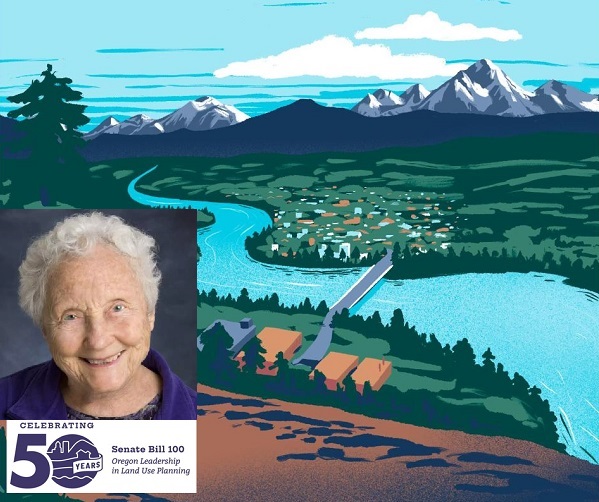
by John Quetzalcoatl Murray
Eugene’s homeless crisis didn’t happen overnight. We now believe that an error nearly 20 years ago set Eugene on its current path, after a 2004 city council vote changed its citizen involvement program.
Planning Goal 1 says cities are supposed to explain how they will evaluate that program. That never happened. From the state of Oregon, Sadie Carney:
Sadie Carney, Oregon Citizen Involvement Advisory Committee: So we have been in contact with the city of Eugene. They don’t seem to have anything on file either… We reviewed the language in Goal 1 and came to the conclusion that because there is no timeline established, that it would be fine for the city of Eugene to submit something today that said, you know, in 2004, we made this change because neither of us seem to have that letter in our possession.
[00:00:52] John Q: Planning Goal 10 says cities ‘shall encourage the availability of adequate numbers of needed housing units, at price ranges and rent levels…commensurate with the financial capabilities of Oregon households.’
[00:01:04] Goal 1 says citizens are supposed to be involved in that planning, and the citizen involvement program is supposed to be evaluated. What might happen if there were no evaluations for 20 years?
[00:01:16] Sadie Carney: I mean, I suppose there could be unintended and negative outcomes. I mean, my experience is that the city of Eugene really does a pretty superlative job with community engagement.
[00:01:30] John Q: Twenty years ago, the city and planning commission left Goal 1 behind, for a different direction. Rather than encouraging public involvement, some say they are suppressing it.
[00:01:41] Pam Wooddell (Friendly Area Neighbors): So yeah, the testimony that Dan Isaacson gave as a planning commissioner, I felt it was out of place.
[00:01:47] Sadly, Eugene has picked the least best way to assure public participation. The citizens’ involvement committee, which is something that the land use laws requires is that every city have a CIC, and Eugene picked the least democratic, the least good way, which was to bury it in the Planning Commission… I don’t think the public outreach is adequate.
[00:02:08] John Q: From a city hearing April 18, 2022, then vice-chair and now chair of the Planning Commission, Dan Isaacson.
[00:02:16] Dan Isaacson (Eugene planning commissioner): Good evening. My name is Dan Isaacson. I’m the vice chair of Eugene planning commissioners. And I’m speaking on behalf of the commission.
[00:02:22] You have before you the culmination of 18 months of work by city staff and the planning commission… It has been vetted by the most robust public engagement process in our councils history…
[00:02:31] As a planning commissioner, I read every email sent to us leading up to our own public comment hearing in November. It was concerning that the voices that we heard came primarily from the same source in the same part of town…
[00:02:43] We owe it to our friends, our neighbors, and the residents of Eugene to have an honest discussion about the housing in our city, free from fear and misinformation…
[00:02:51] As always, change invites both pushback and fear from those who have enjoyed the benefits of a system that now seeks to include others…
[00:02:58] With every new proposal our city has put forward to grow and to be more inclusive, there have been voices of opposition and fear.
[00:03:05] We heard the same arguments against the approval of ADUs, the South Willamette Special Area plan, and as a result slowed the process of building public private partnerships (so housing and smart growth) through endless appeals that almost always have lost, but exacerbate our housing crisis.
[00:03:21] Back in 2013, fear and disinformation took center stage at a rally against the expansion of mother-in-law apartments so aging families could stay together. In an op-ed, it was suggested that the adoption and others like it would lead to ‘five-story canyons looming over our neighborhoods. ‘ It’s been 10 years. I don’t see any five-story canyons.
[00:03:40] With every expansion of the opportunities afforded to some, granted to the new, we hear the same arguments, the same fear, the same people benefiting from both.
[00:03:48] Please take time to ask yourself why that is and continue to show us all what bold leadership looks like for the future of our city.
[00:03:55] John Q: Later that night, the city council heard that the public engagement process was not robust at all, but may have been the worst in city history. An internal whistleblower revealed that city staff deliberately suppressed public involvement.
[00:04:10] Rene Kane (Jefferson Westside Neighbors): Good evening. My name is Rene Kane…
[00:04:12] Now retired, I was originally hired as a land use liaison for Eugene’s neighborhood associations and the community. Eugene’s neighborhood organization recognition policy (NORP) states. ‘The city of Eugene encourages the formation of neighborhood organizations and their involvement in the local government decision-making process.’
[00:04:31] And: ‘Neighborhood organizations will be advisory to the city council, planning commission and other city boards, commissions, and officials on matters affecting their neighborhoods.’
[00:04:42] My work as a neighborhood planner from 2009-21 was almost exclusively with neighborhood associations. I also sat on the implementation team for HB 2001 code amendments.
[00:04:54] However, I was never once asked how best to engage neighborhoods in developing this proposal. In fact, the only tool geared toward neighborhood associations and other community groups was developed without my input. There was no training on the tool and no follow-up to see how it was working.
[00:05:13] How effective was it? I was told by planning staff that one neighborhood organization used it, resulting in one neighborhood response. What a failed opportunity.
[00:05:24] In contrast the 2009 city sponsored neighborhood survey resulted in 4,000 responses—4,000—largely through the effort of volunteer neighborhood boards. Talk about engaging people, literally where they live, in their neighborhoods.
[00:05:42] John Q: If that 2004 council vote reduced citizen involvement, how would the city know whether planning was providing adequate housing units for all incomes?
[00:05:51] Over 20 years, that failure might lead to a chronic shortage of adequate housing, a growing homelessness crisis, renter evictions, small business failures, and eventually the closure of the city’s only hospital.
[00:06:03] We asked Eugene city councilors who participated in that 2004 vote: Knowing what we know today, should the city restore its citizen involvement committee?
[00:06:13] Betty Taylor (former Eugene city councilor): This is Betty Taylor. We need the CIC. I was on it for a while when I was first on council.
[00:06:20] It’s a long time ago now. I’m now 98, which is a really mature age, I think.
[00:06:27] And it was great to have new people come in that way. It’s the way some people got started being interested in government, because they were on the CIC, Citizens Involvement Committee, and it reviewed all committees to make comments. Didn’t have authority, but it could give advice and it was a good thing.
[00:06:48] And it included people from neighborhoods and as I remember a couple of people just from the voters all chosen at random.
[00:06:59] And that’s all they did once a month and got a lunch. And they got interested in government. They heard about things that they would never have thought about. Some people they’d pick at random from the voters rolls (who would accept), would be really, become really interested in what’s going on in government.
[00:07:17] You get a few people, it spreads to other people. And the people from the neighborhood organizations also were able then to go back to their neighborhoods and tell what’s going on, and feel more involved than they would have otherwise.
[00:07:31] I protested when it was changed to the planning commission because I thought it would not amount to anything. The argument by staff was that the planning commission could do that. That is ridiculous. Planning commission does what the city planner wants, and they don’t have that much time, anyway. They don’t have time to do a lot of research.
[00:07:50] It was to save money, I think, but there wasn’t that much money to a lunch for six or eight people once a month. Just a sandwich, nothing fancy. It’s ridiculous. Some of the money-saving things have been huge mistakes, but I think for staff it made things easier.
[00:08:11] John Q: She said the city also abolished another important position.
[00:08:15] Betty Taylor (former Eugene city councilor): Another thing that was abolished about the same time, maybe after that, was the PSO, public service officer, which was another very good thing which helped people, helped councilors and helped citizens.
[00:08:30] It was a person who was able to answer all questions or find the answers about city government. It was a big help to councilors who got questions from constituents. And it was a big help to constituents who could just call if they wanted to. She always, (well, it was a she at the end, it was different people at different times), but she always checked up to be sure that the person had gotten an answer, which was really good, too.
[00:09:00] Something I asked that for for years that I’ve heard of from other cities was a citizen school, which would meet for 10 weeks where people could sign up for it and they learn all about the various departments of the city. And some places do that. The police have people who come in and learn about police, but I thought people should learn about all the departments. And it could be, you know, 10 weeks for one department and then another, or maybe 5 weeks or whatever.
[00:09:33] There are a lot of different ways you could do it, but people could volunteer to sign up to learn about—you could have some sessions in the daytime and some in the evening and I think it should be ongoing all the time, not all the departments at one time, but one after another.
[00:09:50] Citizen schools—and you give them a doughnut or a sandwich or something while they’re there, give them information, then let them ask questions. You know, once they learn about things, then they will be more interested.
[00:10:03] But something that was really good, this was not a city thing, was the Citizens for Public Accountability, a citizens group which formed themselves, they called it CPA, and they really watched everything that was going on with government. They used to have an entry in the Eugene Celebration Parade, even.
[00:10:25] That was a great thing because they really watched what was going on and made comments on it and talked to councilors. If you want people involved, you have to give them the opportunity and then incentive. And being with other people who are interested is an incentive in itself.
[00:10:43] John Q: Some members of CPA went on to join Checks and Balances, the local group that sought greater oversight with a city auditor. That measure was narrowly defeated by voters.
[00:10:53] Betty Taylor (former Eugene city councilor): The mayor killed the auditor, Mayor (Lucy) Vinis. It would have passed if Vinis had not interfered. (Former City Councilor) Bonny (Bettman) and a lot of other people worked so hard on that.
[00:11:05] John Q: Twenty years later, Betty Taylor says the city should have kept its involvement committee and its public service officer. She also recommends citizen schools to teach residents all about city departments, and get more people interested in civic engagement.
[00:11:19] Betty Taylor voted ʻNo’ to abolishing the CIC. We’ve also reached out to councilors who voted ‘Yes,’ including Nancy Nathanson.
[00:11:27] With a final word of advice to Eugene citizens, Councilor Betty Taylor:
[00:11:31] Betty Taylor (Former Eugene city councilor): Well, don’t give up.
Eugene Mayor Lucy Vinis responded to former Councilor Taylor’s statement Sept. 27, 2023, saying the city council voted to place a modified auditor proposal on the ballot, “because the majority of council had serious concerns about the cost of creating the position as proposed by Councilor Bettman.”
Councilor Taylor said, “She killed the auditor by appointing a citizens committee to study the auditor…and, of course, then we ended up with two things on the ballot, which meant they both failed.”
We have reached out to members of the Mayor Vinis’s Performance Auditor Study Group, which held its first meeting Aug. 2, 2017 and presented its report to the city council Nov. 20, 2017.
